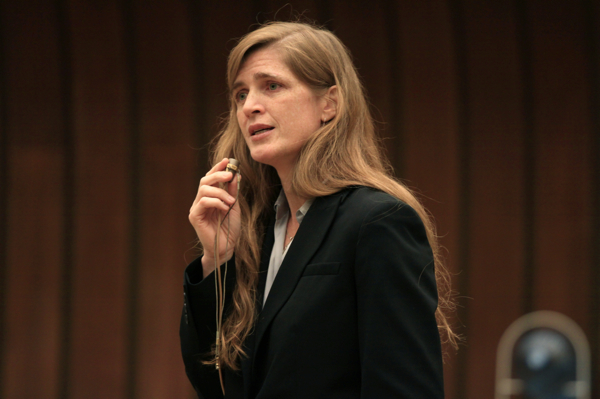The month of March 2002 was a terrible time in both Israel and the West Bank. Some 100 Israelis were killed by Palestinian suicide bombers. Prime Minister Ariel Sharon launched a military operation in the West Bank killing some 500 Palestinians. Children made up a significant number of the victims on both sides. The prospects for an end to violence, let alone peace, appeared lower than at any time previously.
It was against that background that Harvard professor Samantha Power (pictured), now President Barack Obama’s nominee to serve as U.N. ambassador, spoke of the need for U.S. intervention.
She told an interviewer that she did not believe that Sharon or Palestinian President Yasir Arafat would ever stop the killing on their own and that “external intervention is required.” She specifically called on the United States to “put something on the line,” by which she meant the “imposition of a solution on unwilling parties.” Admitting that the idea of imposing a settlement was “fundamentally undemocratic,” she said it was preferable to “deference” to leaders who seem “politically destined to destroy the lives of their own people.”
| All she had to do to became ambassador to the U.N. was recant views that the Jewish lobby found offensive. Rest assured, she will not criticize Israeli actions again. |
This was not surprising coming from Power. She is the leading advocate of what is known as “liberal interventionism.” She has said that as a child she was shaken by the world’s indifference to the Holocaust. Her feelings were deepened by her experiences as a journalist in Bosnia. Ever since, most notably in the case of Libya, Power has recommended “going in” to stop the killing of innocents. Right or wrong, it’s who she is.
Unfortunately for Power, the reality of U.S. politics dictates that the Israeli-Palestinian conflict be exempted from rules or theories one applies elsewhere. That is why some of the most aggressively anti-war, pro-human rights progressives in Congress, the media and the blogosphere simply go silent, at best, on the subject of the Israeli occupation or, at worst, openly support military actions like Israel’s wars in Gaza. They know that the Israel lobby will make life very difficult for those who insist on applying the same moral yardstick to Israel as to other nations.
Power alluded to that fact of life in the same interview in which she called for intervention. Right after calling on the United States to impose a peace settlement, she added that that “might mean alienating a domestic constituency of tremendous political and financial import.” It did.
Six years later when Democratic Presidential candidate Barack Obama listed Power as one of his foreign policy advisors, members of the lobby crowd went ballistic. The Zionist Organization of America, Commentary, and a host of right-wing Israel advocates said that Power was an enemy of Israel and even possibly an anti-Semite. It was made clear to Obama that nominating her to a major foreign policy position would ignite a firestorm. Obama responded by placing her in a White House job that did not require Senate confirmation.
Power wanted more in an Obama second term and that required inoculating herself against charges that were made against her in 2008. And so she made the rounds — visiting neocons, Jewish organizations, and Israeli officials – and assuring potential adversaries that she was sorry.
Here is the best description of Power’s apology tour. It comes from Orthodox Rabbi Shmuley Boteach (a GOP candidate for Congress in the 2012 election). Writing in The Huffington Post, Boteach reveals that in 2011 Power approached him to say she wanted “to go on the record about her comments on Israel and how they had been misunderstood.” He then convened a “closed-door meeting of about 40 American Jewish leaders who represented a wide spectrum of our communities most important organizations.”
And, according to Boteach, Power was contrite. She denied “animus toward Israel.”
And in the presence of the leaders of our community, she suddenly became deeply emotional and struggled to complete her presentation as she expressed how deeply such accusations had affected her. Tears streamed down her cheeks and I think it fair to say that there was no one in the room who wasn’t deeply moved by this incredible display of pain and emotion.
That “incredible display” did the trick.
More than a few of the leaders in the room came over to me afterward and said that, based on her comments and her unabashed display of emotional attachment to the security of the Jewish people … they would never again question her commitment to Israel’s security.
Mission accomplished.
Boteach now says that he takes his “yarmulke off” to salute Obama’s nomination of Power. He isn’t alone. This time the neocons are lining up to support her. Even the Israeli government has jumped on the Power bandwagon, with its ambassador to the United States endorsing her appointment.
And that almost surely means that Power will achieve the United Nations job. All she had to do was recant views that the lobby found offensive. Rest assured, she will not criticize Israeli actions again.
But don’t be quick to condemn her. If the lobby opposed her she could not get the U.N. post or any job requiring Senate confirmation. That is the political reality in 2013. The Constitutional “advise and consent” function is now exercised by the lobby (see Hagel, Chuck). What is a talented and ambitious public servant supposed to do?
But imagine if a nominee for a high U.S. foreign policy post had shed tears to demonstrate devotion to any foreign country other than Israel. No, don’t. It would never happen.
M.J. Rosenberg is a Special Correspondent for The Washington Spectator. He was most recently a Foreign Policy fellow at Media Matters For America. Previously, he spent 15 years as a Senate and House aide. Early in his career he was editor of AIPAC’s newsletter Near East Report. From 1998-2009, he was director of policy at Israel Policy Forum. Follow him @MJayRosenberg and @WashSpec.






0 Comments